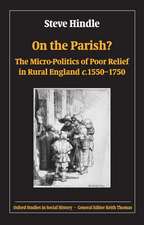Capitalism and Antislavery: British Mobilization in Comparative Perspective
Autor Seymour Drescheren Limba Engleză Hardback – 22 ian 1987
| Toate formatele și edițiile | Preț | Express |
|---|---|---|
| Hardback (2) | 467.38 lei 32-37 zile | |
| Oxford University Press – 8 ian 1987 | 467.38 lei 32-37 zile | |
| Palgrave Macmillan UK – 22 ian 1987 | 639.69 lei 6-8 săpt. |
Preț: 639.69 lei
Preț vechi: 752.58 lei
-15% Nou
Puncte Express: 960
Preț estimativ în valută:
122.41€ • 128.72$ • 101.14£
122.41€ • 128.72$ • 101.14£
Carte tipărită la comandă
Livrare economică 17 aprilie-01 mai
Preluare comenzi: 021 569.72.76
Specificații
ISBN-13: 9780333362099
ISBN-10: 0333362098
Pagini: 300
Ilustrații: XV, 300 p.
Dimensiuni: 140 x 216 x 22 mm
Greutate: 0.55 kg
Ediția:1986
Editura: Palgrave Macmillan UK
Colecția Palgrave Macmillan
Locul publicării:London, United Kingdom
ISBN-10: 0333362098
Pagini: 300
Ilustrații: XV, 300 p.
Dimensiuni: 140 x 216 x 22 mm
Greutate: 0.55 kg
Ediția:1986
Editura: Palgrave Macmillan UK
Colecția Palgrave Macmillan
Locul publicării:London, United Kingdom
Cuprins
Foreword; Christine Bolt - Preface - A Chronology of Emancipation, 1772-1888 - The Foundations of Slavery and Antislavery - Border Skirmish: Neither Wages nor the Whip - The Distinctiveness of British Abolitionist Mobilization - The Breakthrough, 1787-1792 - The Impact of Popular Mobilization in Britain and the Caribbean - Gods Work: Antislavery and Religious Mobilization - Class Conflict, Hegemony and the Cost of Antislavery - Antislavery and Capitalism - Notes - Bibliography - Index
Descriere
Descriere de la o altă ediție sau format:
The age of British abolitionism came into consolidated strength in 1787-88 with the first mass campaign against the slave trade and ended just half a century later in 1838 with a mass petition movement against Negro Apprenticeship. Drescher focuses on this critical fifty-year period, when the people of the Empire effectively pressured and eventually altered national policy. Presenting a major reassessment of the roots, nature, and significance of Britain's successful struggle against slavery, he illuminates a novel turn in the history of antislavery, when for the first time, the most effective agents in the abolition process were non-slave masses, including working men and women. This not only set Britain off from ancient Rome, medieval western Europe, and early modern Russia, but, in scale and duration, it distinguished Britain from its 19th-century continental European counterparts as well. Viewing British abolitionism against the backdrop of larger national and international events, this provocative study challenges readers to look anew at the politics of slavery and social change in a prominent era of British history.
The age of British abolitionism came into consolidated strength in 1787-88 with the first mass campaign against the slave trade and ended just half a century later in 1838 with a mass petition movement against Negro Apprenticeship. Drescher focuses on this critical fifty-year period, when the people of the Empire effectively pressured and eventually altered national policy. Presenting a major reassessment of the roots, nature, and significance of Britain's successful struggle against slavery, he illuminates a novel turn in the history of antislavery, when for the first time, the most effective agents in the abolition process were non-slave masses, including working men and women. This not only set Britain off from ancient Rome, medieval western Europe, and early modern Russia, but, in scale and duration, it distinguished Britain from its 19th-century continental European counterparts as well. Viewing British abolitionism against the backdrop of larger national and international events, this provocative study challenges readers to look anew at the politics of slavery and social change in a prominent era of British history.
Recenzii
"Drescher compellingly presents antislavery as one of the most successful reform movements of its time. His broad comparative framework sharpens the contrast between abolitionist developments in Britain and those on the Continent and in America. In concentrating on the crucial role of popular opinion and the economic forces which fostered it, Drescher enriches our understanding of the distinct and varied history of British antislavery....Should become a standard against which future works will be measured."--Albion
"He has mastered the vast literature on the movement and has added significant research of his own on points in dispute. To this scholarship he adds a probing critical sense that can raise fundamental thematic and interpretive questions....The research and reflection that went into it should make this book compulsory reading for years to come for all interested in the wider perspectives of antislavery."--American Historical Review
"Marshaling masses of new evidence, it digs down to what Drescher calls the 'anthropological roots' of antislavery, and puts in new perspective many facets of a long-running debate....It should appeal both to the general reader and to the specialist."--Wilson Quarterly
"Will significantly influence the course of the historical debate on British abolitionism."--Civil War History
"An effective analysis of the combined power of moral indignation, religious commitment, and politics in subduing powerful economic interests...[provides] a wealth of fascinating, sometimes grim detail...related with aplomb and an enviable command of the relevant sources."--Journal of Economic History
"He has mastered the vast literature on the movement and has added significant research of his own on points in dispute. To this scholarship he adds a probing critical sense that can raise fundamental thematic and interpretive questions....The research and reflection that went into it should make this book compulsory reading for years to come for all interested in the wider perspectives of antislavery."--American Historical Review
"Marshaling masses of new evidence, it digs down to what Drescher calls the 'anthropological roots' of antislavery, and puts in new perspective many facets of a long-running debate....It should appeal both to the general reader and to the specialist."--Wilson Quarterly
"Will significantly influence the course of the historical debate on British abolitionism."--Civil War History
"An effective analysis of the combined power of moral indignation, religious commitment, and politics in subduing powerful economic interests...[provides] a wealth of fascinating, sometimes grim detail...related with aplomb and an enviable command of the relevant sources."--Journal of Economic History
























